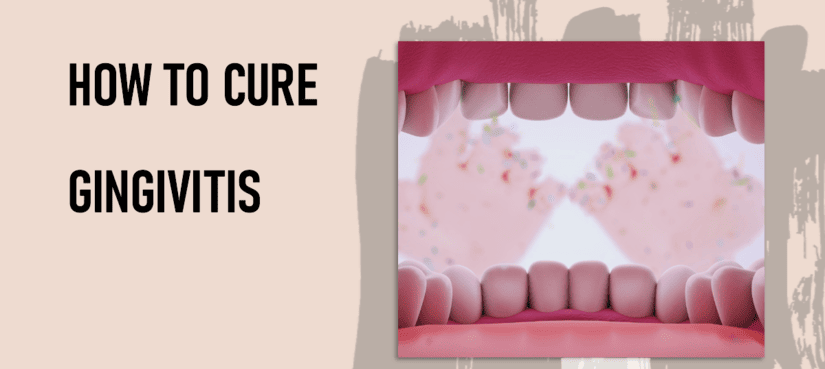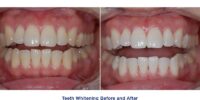How To Cure Gingivitis: Home Remedies & Treatments

Gingivitis is a common dental disease that causes inflammation of the gums and can lead to serious dental problems if left untreated. It’s important to know how to cure gingivitis so that you can keep your teeth and gums healthy.
In this article, you’ll learn about the different home remedies and treatments available to help you cure gingivitis. You’ll also learn how quickly gingivitis heals and whether or not brushing out the condition is a viable option. So, let’s get started and discover how to cure gingivitis.
You don’t have to visit the dentist to cure gingivitis. There are a number of home remedies and treatments available that you can try. From salt water to different kinds of mouthwashes, you can find many ways to restore your gums to health.
You’ll also learn how quickly gingivitis heals, and the importance of brushing your teeth regularly to reduce the risk of it returning. So, if you’re looking for ways to naturally treat gingivitis, you’ve come to the right place!
What is gingivitis? Definition
Gingivitis is a type of gum disease that occurs when the gums become inflamed and infected. It’s caused by the buildup of plaque on the teeth, which contains bacteria that irritates the gums. This results in redness, swelling, and tenderness around the gums.
If left untreated, it can lead to more serious forms of gum disease, such as periodontitis. Gingivitis can be prevented by brushing and flossing your teeth twice a day, eating a balanced diet, and visiting your dentist regularly.
Treatment for gingivitis includes professional cleaning, antibiotics, and certain home remedies.
Can gingivitis be cured?
You have the power to take control of your dental health – don’t let it get away from you. Gingivitis is the earliest form of gum disease and is caused by plaque build-up on the teeth and gums.
The good news is, if caught early, gingivitis can be cured. The best way to cure gingivitis is to remove the plaque before it has a chance to cause irreversible damage. This can be done by brushing and flossing your teeth at least twice a day and visiting your dentist regularly for a professional cleaning.
You should also limit your intake of sugary foods and drinks, which can contribute to the build-up of plaque. Additionally, using an anti-bacterial mouthwash can help to reduce inflammation and kill any bacteria that may be contributing to the gingivitis.
By taking these steps, you can help to prevent and treat gingivitis, allowing you to maintain a healthy, happy smile.
Can you fix gingivitis yourself?
Take charge of your dental health now and don’t let gingivitis get the best of you! While you should always consult a dentist to determine the best course of action for treating gingivitis, you can take steps to treat it yourself.
Here are some tips for fixing gingivitis yourself:
- Brush and floss regularly and correctly
- Use mouthwash to reduce bacteria
- Avoid smoking and other tobacco products
- Eat healthy foods and take a multivitamin daily
Making lifestyle changes can help to reduce the symptoms of gingivitis, such as swelling and bleeding. Taking the time to properly brush and floss your teeth and keeping up with regular dental visits can help to prevent the onset of gingivitis.
Additionally, avoiding products that can aggravate gingivitis, such as tobacco, can help to reduce the risk. Eating healthy foods and taking a multivitamin to ensure that your body is getting the nutrients it needs is also beneficial.
With these steps, you can help to reduce the symptoms of gingivitis.
How do dentists treat gingivitis?
Dentists often recommend a variety of treatments to help keep gingivitis at bay, so it’s important to keep up with regular dental visits. Some of the most common treatments they recommend include scaling and root planing, antibiotics, and laser therapy. Scaling and root planing involves removing plaque and tartar buildup from below the gum line, while antibiotics may be used to fight bacteria in the mouth. Laser therapy is a newer form of treatment that uses a special laser to target bacteria and reduce inflammation.
| Treatment | Benefits |
|---|---|
| Scaling and Root Planing | Removes plaque and tartar buildup |
| Antibiotics | Fights bacteria in the mouth |
| Laser Therapy | Targets bacteria and reduces inflammation |
Your dentist may also recommend other treatments such as fluoride treatments or mouth rinses to help with gingivitis. It’s important to follow your dentist’s instructions for the best results and to make sure that any underlying issues are being addressed. With the proper care and attention, you can help keep gingivitis at bay and maintain healthy gums.
How to cure gingivitis
Taking control of your oral health is key to keeping gingivitis at bay! Curing gingivitis is possible with a combination of treatments and lifestyle changes.
First and foremost, make sure you brush and floss regularly. Doing so removes plaque and bacteria that cause gingivitis.
Additionally, you should:
- Use a mouthwash containing antibacterial ingredients
- Avoid eating sugary foods and drinks
- Visit your dentist regularly for cleanings
These steps can help you treat and cure gingivitis.
In addition to these, your dentist may recommend other treatments such as antibiotics or a laser procedure. These treatments can help reduce symptoms and keep gingivitis from becoming more serious.
Following these treatments and taking control of your oral health can help you cure gingivitis.
Can salt water cure gingivitis?
Ridding yourself of gingivitis doesn’t have to be complicated – it could be as simple as rinsing with salt water!
Salt water is an age-old remedy for many oral health issues, including gingivitis. Salty water can help reduce inflammation and eliminate bacterial buildup in the mouth. It can also help reduce the risk of plaque buildup, which is one of the main causes of gingivitis.
To make salt water, mix 1 teaspoon of salt with 8 ounces of warm water and rinse your mouth with it after meals or as needed. However, it’s important to use salt water in moderation, as it can dry out your gums if used too often.
Salt water should be used in conjunction with other home remedies and treatments for best results.
How quickly does gingivitis heal?
Gingivitis can heal quickly, but it’s important to be consistent with your oral hygiene routine to see the best results. If gingivitis is caught early, it can often be reversed with good oral hygiene practices like brushing and flossing.
For more serious cases, you may need to visit a dentist or periodontist for a scaling and root planing procedure to remove plaque and tartar buildup.
The healing process for gingivitis can differ depending on the severity of the condition and how well you follow your dentist’s instructions. It’s important to keep up with your oral hygiene routine and visit your dentist regularly for checkups and cleanings to help reduce your risk of gingivitis or to help it heal faster.
If you follow your dentist’s advice, you may see improvements in as little as two weeks.
Can you brush out gingivitis?
Brushing your teeth is an important part of your oral hygiene routine and can help prevent and treat gingivitis. While brushing can help remove plaque and bacteria that cause gum disease, it’s not the only part of the solution. To effectively manage gingivitis, you should also use a mouthwash and floss on a regular basis.
Yes, brushing your teeth can help reduce the symptoms of gingivitis. Plaque and bacteria can accumulate on your teeth and cause your gums to become inflamed and infected. By brushing your teeth twice a day, you can help remove plaque and bacteria and reduce the inflammation and infection of your gums.
In addition, flossing and rinsing with an antiseptic mouthwash can also help reduce the symptoms of gingivitis.
Conclusion
You can cure gingivitis yourself with simple home remedies and treatments. Brush your teeth twice a day, floss daily, and use a mouthwash. Additionally, be sure to visit the dentist regularly for professional cleanings and treatments.
Salt water can also be used to reduce inflammation and remove bacteria from the mouth. With regular care and attention, you can heal gingivitis quickly and prevent it from returning.
Taking the time to care for your oral health is important for your overall wellbeing. So take a few extra minutes a day to brush and floss and you’ll be on your way to having a healthy, beautiful smile.









